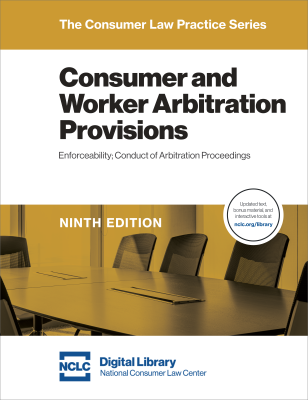The CFPB is proposing new limits on forced arbitration, the latest in a series of such limits. This article examines the CFPB proposal (examined in even more detail in Consumer Arbitration Agreements § 1.7) and lists seven other significant new or potential restrictions on arbitration requirements, and then briefly summarizes other court challenges to arbitration agreements.
CFPB’s October 7, 2015 Proposal Allows Class Claims to Trump Arbitration Requirements
On October 7, 2015, the CFPB released an “Outline of Proposals under Consideration and Other Proposals Considered” ("Proposal Outline") in preparation for the convening of a Small Business Advisory Review Panel that must precede the publishing for comment the CFPB’s proposed rule limiting forced arbitration.
The Proposal Outline would require creditors and most other entities within the CFPB’s authority to explicitly provide that their arbitration requirements do not apply to cases filed in court as class actions unless class certification is denied or the class claims are dismissed. The proposal would thus allow class actions to proceed in court despite any arbitration requirement.
The Proposal Outline also would require that creditors and most other entities within the CFPB’s authority submit to the CFPB all initial arbitration claim filings and written awards. Significantly, this disclosure requirement is the only limit that would be placed on the requirement that individual consumer claims be subject to arbitration. Under the current proposal, the CFPB would not restrict in any way arbitration clauses as applied to individual claims, and would not even impose safeguards to insure fundamental fairness for individual disputes in arbitration.
Entities Covered by the CFPB Proposal
The Proposal Outline is clear that the new requirements would apply to banks, credit unions, certain auto lenders, small-dollar or payday lenders, auto title lenders, installment and open-end lenders, private student lenders, providers of other credit in certain contexts, loan originators, providers of certain auto leases, remittance transfer providers, prepaid card issuers, certain providers of virtual currency, check cashing providers, credit service/repair organizations, debt settlement firms, providers of credit monitoring, and debt buyers. Less clear is the coverage as to governmental bodies providing consumer financial products (e.g. tribal payday lending) and the coverage of “buy here pay here auto dealers.” The CFPB proposal does not apply to employers, insurers, merchants not providing credit, or other entities outside the CFPB's jurisdiction.
The Rulemaking Process
The CFPB now has authority to limit consumer arbitration agreements as to covered entities, because, as required by statute, it has first conducted a study of arbitration agreements, and in March, 2015 submitted a 700 page report to Congress.
The October 7 Proposal Outline was prepared as part of a further requirement that any proposed rule describe the impact of the proposal on small entities. Pursuant to this requirement, the CFPB will be convening of a Small Business Advisory Review Panel to seek information on this impact, before issuing a proposed rule. After this process, the CFPB will publish a proposed rule that will be open for comment, before promulgating a final rule.
Court challenges to any final rules are expected and there are also efforts in Congress to stop the rule by appending a rider to pending legislation. Finally, a federal statute provides that the rule will only affect arbitration agreements “entered into” 180 days after the effective date of the final rule. Left open is whether a creditor amending an existing contract or a creditor purchasing a seller’s contract would be “entering” into a contract, or whether the contract is only entered into when first consummated.
The CFPB has stated that it anticipates publishing the rule at least 30 days before its effective date, meaning that it would only cover agreements entered into at least 210 days after the rule is published. All of these steps taken together make it unlikely that any rule would apply to contracts entered into before 2017.
Other Recent Limits on Mandatory Arbitration Requirements
- Mortgage Loans: Effective at least as of June 1, 2013, no mortgage loan documents can contain an arbitration requirement (see Consumer Arbitration Agreements § 4.2.2.1), and there is a good argument that mortgage lenders now cannot enforce earlier arbitration agreements against the homeowner’s federal claims. See Id. § 4.2.2.2
- Manufactured Home Credit: The same limits apply to manufactured home credit sales. See Consumer Credit Regulation § 7.4.2.2.
- Long-Term Care Facilities: The Department of Health and Human Services on July 16, 2015, proposed severe restrictions on long-term care facilities’ use of arbitration agreements, including prohibiting these facilities from making assent to such an agreement a condition of entering a long-term care facility. See 80 Fed. Reg. 42168 (July 16, 2015); see also 80 Fed. Reg. 42168 (Sept. 15, 2015).
- Written Warranties: On May 28, 2015, the FTC reiterated its position that the Magnusson-Moss Warranty Act prohibits forced, binding arbitration of written warranty claims. See Consumer Arbitration Agreements § 4.3.2.
- Credit Offered to Servicemembers and Dependents: Federal law presently prohibits arbitration agreements when servicemembers or their dependents take out payday, auto title, or refund anticipation loans. See 32 CFR 232. Effective October 3, 2016, this will apply to many more types of credit entered into by servicemembers and dependents. See 80 Fed. Reg. 43559 (July 22, 2015).
- Discrimination or Harassment Claims Brought against Federal Contractors: On July 31, 2014, the President signed an Executive Order that prohibits federal contractors from using forced arbitration clauses covering discrimination or harassment claims; the order covers all of these contractors’ employment agreements, even those with employees who do not work on federal contracts.
- State Law Limits on Arbitration Not Preempted by the FAA: NCLC’s 2015 Model State Consumer and Employee Justice Enforcement Act sets out seven different state law limits on arbitration that states can enact that are not preempted by the Federal Arbitration Act.
Thumbnail Sketch of Issues Related to Challenging Arbitration Agreements
- Is there a binding agreement? The CFPB has found that almost all agreements covering prepaid cards, payday loans, private student loans, and cell phones include arbitration clauses, and other evidence indicates that a large percentage of auto dealers include arbitration clauses in their contracts. But arbitration agreements do not apply to every consumer transaction, and a company cannot insist on arbitration if it cannot produce an arbitration agreement that is binding on the consumer. A surprisingly large number of credit card and bank account agreements do not contain an arbitration requirement (while many do). Furthermore, credit reporting agencies and other merchants often do not have a contractual relationship with consumers, and thus do not have an arbitration agreement to invoke. Debt collectors and debt buyers, even when they are potentially covered by an arbitration agreement in the underlying credit transaction, may be unable to produce the contract containing the arbitration clause. In addition, there may be reasons why the contract containing the arbitration clause has not been properly formed and executed, including incapacity, the failure of a condition precedent, and, particularly in online transactions, lack of notice of the terms of the contract. See Consumer Arbitration Agreements chapter 5.
- Is there a “delegation clause?” The CFPB has found that almost all arbitration clauses today require that any dispute about the arbitration clause’s enforceability be delegated to the arbitrator, so that any court challenge to an arbitration clause must first challenge this delegation clause—e.g. if an arbitration clause requires an inconvenient venue, the first court challenge is that the delegation clause requires an inconvenient venue. See Id. § 2.2.3.
- Are the parties to a dispute and the dispute covered by the arbitration agreement? A non-signatory to an arbitration agreement may not be able to enforce (or may not be bound by) the agreement, and a dispute may be outside the scope of an agreement. See Id. chapter 7.
- The designated forum is unavailable. A consumer cannot be compelled to arbitrate before a forum that is not actually open for arbitration. For example, millions of older agreements designate the National Arbitration Forum as the sole arbitration administrator, but the NAF can no longer administer arbitrations, so that many courts find the arbitration requirement unenforceable. Recently, arbitration clauses (particularly in payday lending agreements) have been designating a tribal forum, and some courts find these tribal forums are unavailable and the arbitration clause unenforceable. Id. § 5.8.
- Participating in court litigation waives the arbitration requirement. A company cannot participate in court litigation on a matter and then suddenly change its mind and require the case to be sent to arbitration. This is particularly the case where this prejudices the consumer. Id. chapter 8.
- Unconscionability and “Effective Vindication.” Depending on state law, courts may find an arbitration agreement unconscionable and unenforceable when there is an adequate showing of procedural unconscionability (e.g., small print, lack of choice, uneven bargaining power, take-it-or-leave-it negotiation) and substantive unconscionability, such as where the consumer must bear unaffordable costs, forgo statutory remedies, arbitrate in an inconvenient venue or before a biased tribunal, forgo necessary discovery, pay all arbitration costs if he or she does not prevail, or where only the consumer, not the creditor must arbitrate disputes. Id. chapter 6. Similar principles may render arbitration agreements unenforceable as a matter of federal law if they prevent a consumer from effectively vindicating her federal statutory rights. Id chapter 4.
- Core bankruptcy matters. When a consumer, as part of the consumer’s bankruptcy proceeding, litigates core bankruptcy matters, the bankruptcy court has discretion whether to require the matter to be removed to arbitration or be heard before the bankruptcy judge. Id. § 4.3.3
- Class arbitration, when available, is a powerful tool. Not all arbitration clauses prohibit class arbitration. Where they do not, the Supreme Court has clarified that an arbitrator can decide that the arbitration clause allows for class arbitration—a procedure that companies often fear more than a class action in court. See Id. chapter 9.


